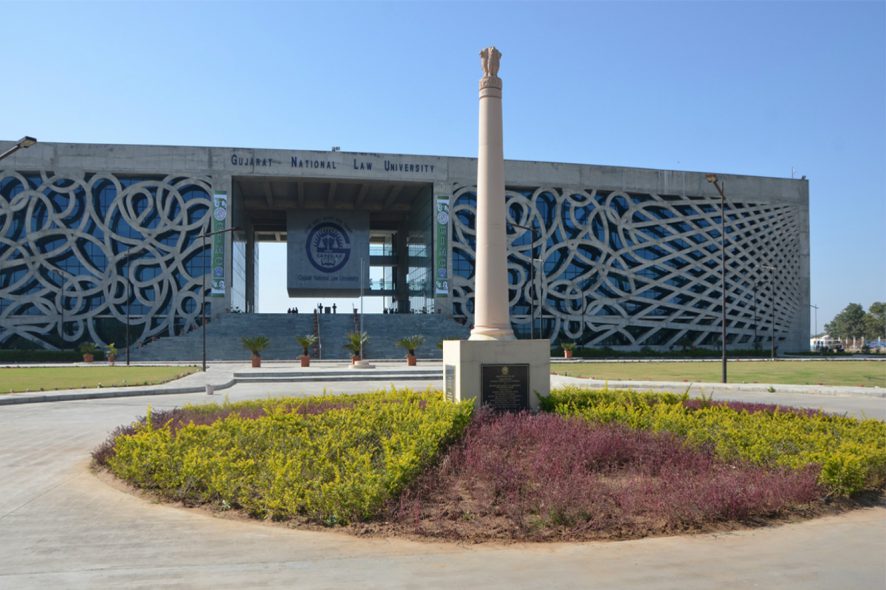About CCAL: The Centre for Constitutional and Administrative Law (CCAL) was established at Gujarat National Law University to conduct dedicated research in various areas of Constitutional and Administrative Law. The objective of the CCAL is to promote understanding of the Indian Constitution and Administrative Law from various perspectives – legal, political, social, economic, historical etc. as well as to provide avenue for students for freely express their views on challenges to the Constitution. It provides a platform to the students to carry out dedicated research in various areas of Constitutional and Administrative Law.
Theme of the competition: The concept which is still in the discussion stage, after being proposed by the Union Government, can be the future of democracy of the nation. Elections are considered to be the bedrock of a democracy where voters decides the fate of a nation. They make a fundamental contribution to the democratic governance of the nation. Elections in India have gone through several stages of improvisation as a result of methods adopted and steps taken by Election Commission of India (ECI) and the Government.
“One Nation, One Election” is seen as one such step to save the tax payers’ money and citizens’ fatigue involved in the frequent holding of elections. There is significant impact on the development programs and governance due to imposition of Model Code of Conduct by the Election Commission and massive expenditures by Government and other stakeholders including the engagement of security forces for significantly prolonged periods for the conduction of elections. However, there are always two sides to a coin. One needs to understand that the spirit of democracy prevails and political diversity & quasi-federal structure of the nation always remains preserved. The need of the hour is to go beyond rhetoric and simplified stances and then analyses the implications of the change in election regime in the world’s largest democracy. The ECI is of the view that it is not impossible to conduct a single election throughout the nation simultaneously provided there is a political consensus over it. Constitutional experts such as Dr. Subhash C. Kashyap also opine that gradually India must move to hold Lok Sabha and Assembly elections simultaneously.
In light of this backdrop, this competition has been designed with the major objective to create a meaningful dialogue on the topic through an active participation of young voices of the nation and to promote public understanding and participation on the topic. Participants are permitted to base their essay on any aspect of the main theme and are expected to provide academic consideration to this concept.
Important Guidelines:
- A committee of experts shall be constituted as a Jury, to select the winning entries. The decision of the Jury shall be final and binding.
- CCAL possesses the right to reject entries which not conform to the Guidelines for Submission.
- The essays published elsewhere or selected/ submitted for publication elsewhere shall be disqualified.
- The Organizing Committee reserves the absolute rights to cancel, defer, or postpone indefinitely, the competition in the event of the accruing of any incident; natural or manmade.
- Co-authorship is permitted up to a maximum of two authors per entry.
- The main body of the essay should not carry any mention of the name of the author, contact details, or the name of the institution.
- Multiple submissions by any participant will lead to disqualification of all the essays so submitted.
- Late submission will not be accepted.
- All rights of winning submissions will vest with Gujarat National Law University. All matters pertaining to the eligibility of participants and essays, evaluation of submissions and awarding of prizes is within the sole and absolute discretion of the CCAL.
- In case of any dispute, decision of the CCAL shall be final and binding.
Submission Guidelines: All text should be justified.
Formatting guidelines:
- Font Type: Garamond.
- Font Size: 16 (Theme), 14 (Subtitle), 12 (Text), 10 (Footnote).
- Line Spacing: 1.5 and Footnotes 1.
- Citation Method: OSCOLA, 4th Edition.
- Word Limit: 3000-5000 Words
The soft copy of the essay must be emailed to ccal@gnlu.ac.in, with the subject as “Submission: Essay Writing Competition 2017”. The essay must be sent in a Word Document (.doc or .docx) AND in a PDF format. The email should carry the subject as “Essay Submission: _Title of the essay_”
The Essay must be accompanied by the following documents:
- A Scanned Copy of University/Institution Identity Card.
- A cover letter (separate word document) containing details (co-author details also to be provided, in the same document):
Eligibility: All students pursuing Under-Graduate and PostGraduate courses from any recognized university.
Important date: Last date of Submission: 15th November, 2017
Evaluation Criteria:
- Each Essay will be scored against a maximum mark of 100.
- The Essays will be judged based on the following criteria:
>Research and Content- 30 marks
>Clarity of thought and expression- 30 marks
>Formatting and presentation – 20 marks
>Originality of thought – 20 marks
Contact us:
Patron: Prof. Dr. Bimal N. Patel, Director, GNLU
Convener: Mr. Avinash Bhagi, Director, CCAL.
Faculty Coordinator:
1. Shashibhushan Sharma, ssharma@gnlu.ac.in
2. Anu Mishra, amishra@gnlu.ac.in
Student Coordinator:
Ms. Kaazvin Kapadia, kaazvin96@gmail.com, Ph. No. :8128654583
In case of query, please send an email to ccal@gnlu.ac.in







